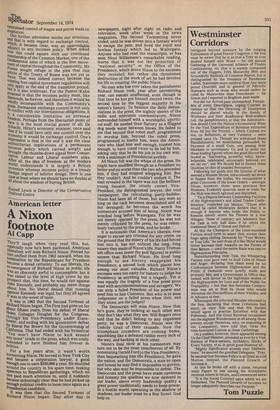American letter
A Nixon footnote footnote
Al Capp
They'll laugh when they read this, but, F.sPecially now he's been pardoned, American liberalism will miss Richard Nixon. Hatred for him unified them from 1962 onward, when his omination by the Republicans for President 'came a dread certainty. To our liberals, the re-emergence of Richard Nixon in public life was an obscenity awful to contemplate; but it Was raised to the level of high crime by the Prospect that, this time, he would run against '°hri Kennedy, and probably say mean things about him. No liberal denied that running a, gainst Kennedy was legal, but they all agreed it was in the worst of taste. It was in 1962 that the Second Torment of Richard Nixon began. The First had gone on for ,.ahout fifteen years, from his defeat of liberal rlelen Gahagan Douglas for the Congress, his Vice-Presidency under Eisen'lower, and ending with his ignominous defeat hY liberal Pat Brown for the Governorship of California. That had ended with his hysterical `foll won't have Nixon to kick around any more" tirade to the press, which was cosily conceded to have finished him forever in politics.
For a few years after, it wasn't wOrth tormenting Nixon. He moved b.:, New York City and became a corporation lawyer, a good enough one to earn $250,000 a year. He shuttled around the country in his spare time, making speeches to Republican gatherings, which no one paid much attention to, until it suddenly became sickeningly clear that he had picked up enough political credits to loom once again as a Presidential candidate.
It was then that the Second Torment of Richard Nixon began. Day after day in newspapers, night after night on radio and television, week after week in the news magazines. The Second Tormenting never ended, until he was driven into a fantasy world to escape the pain, and lived the royal and lawless fantasy which led to Watergate. Anyone who had read the transcripts, or has seen Nicol Williamson's remarkable reading, learns that it was not the protection of "national security" or the Office of the Presidency, which drove Nixon to the excesses they revealed, but rather the threatened destruction of the work of art he had devoted his life to creating: the public Nixon.
No man who has ever taken the punishment Richard Nixon took, year after unremitting year, can remain unaffected, even though in that time he has got himself elected twice, the second time by the biggest majority in his nation's history. To balance the daily denun ciations in the press, the nightly sneers of the radio and television commentators, Nixon'
surrounded himself with a worshipful, uncriti-.
cal staff. He needed their flattery as a flogged dog needs water between blows. He failed to see that beyond that robot staff, programmed to worship hirn, beyond the robot press, programmed to loathe him, were the Ameri cans who liked him well enough, trusted him enough, to have voted twice to be led by him, asking only that he do his job in his own way, with a minimum of Presidential perfidy. . All Nixon felt was the whips of the press. He might have muddled through as a President no better and no worse than the two who preceded him, if they had stopped whipping him. But they couldn't. And he couldn't endure it. The man revealed in the tapes was not the brilliant young Senator, the utterly correct Vice ; President, the distinguished lawyer, the cool campaigner, the calculating party-builder. Nixon had • been all of those, but any man so long on the rack becomes demolished and all but deranged; he becomes the wreck his tormentors accused him of being. Nixon was wrecked long before Watergate. For he was not merely opposed by the press, he was not merely criticised by the press, he was relentlessly tortured by the press, and he broke. It is noticeable that America's liberals, ever eager to excuse any criminal for any crime, on the ground that the misery of his life had forced him into it, has not . noticed the long, long misery they made of Nixon's life. Harry Truman left office even lower (by poll figures) in public esteem than Richard Nixon. He lived long enough to see history reappraise his Presidency, a second look which places him among our most valuable. Richard Nixon's excesses were too nasty for history to judge his Presidency as anything but a tragedy. Yet it was equally the tragedy of a free press gone mad with sanctimoniousness and savagery. We can strip a failed President of his power and send him to San Clemente. But who is to pass judgement on a failed press when they, and they alone, are the judges? The Democrats will miss Nixon. Now that he's gone, they're looking at each other and they don't like what they see. Will Rogers once said that he didn't belong to any organised party; he was a Democrat. Nixon was the Unholy Grail of their crusade. Now the triumphant crusaders are coming home, squabbling like a defeated rabble every inch of the way, and hacking at each other.
Nixon's final blow at his tormentors may turn out to be the most treacherous of all. By nominating Gerald Ford to the Vice-Presidency, then bequeathing him the Presidency, he gave the nation, and the Democrats, a man so open and honest he may find it impossible to govern, but who also may be impossible to defeat. The Democrats and the press have made openness and honesty the qualities we now demand in our leader, above every leadership quality a great power traditionally needs to keep power.
In a hostile world, operating in the shadow of shadows, our leader must be a Boy Scout. God help us.


































































 Previous page
Previous page